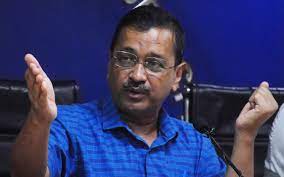
In a fervent display of concern, Delhi Chief Minister Arvind Kejriwal, along with other leaders from the Aam Aadmi Party (AAP), has strongly criticized the Government of National Capital Territory of Delhi (GNCTD) Amendment Act, 2023, branding it a “licence to rebel.” The Act, in their view, provides bureaucrats with the means to openly defy the directives of an elected government, thereby undermining the democratic authority of ministers and elected representatives. The issue has ignited a heated debate on governance dynamics within the capital.
The contentious remarks followed a press conference by Services Minister Atishi, who disclosed that the principal secretary (finance), A C Verma, had declined to adhere to her instruction to appoint a lawyer for filing a petition in the Supreme Court. This petition aimed to challenge a High Court verdict concerning a Goods and Services Tax (GST) refund matter related to the Delhi government.
Citing instances where officers within the government hierarchy have resisted directives, Chief Minister Kejriwal expressed grave concern over the implications of the Services Act. He asserted that the Act provides a “license to officers to openly rebel against written orders of elected govt,” terming it a threat to the efficient functioning of Delhi and insinuating that the Act aligns with BJP’s interests. Kejriwal’s concerns center on the Act’s potential to undermine governance stability and the rule of law.
Atishi further highlighted the apprehensions of a potential “revolt” by bureaucrats following the enforcement of the GNCTD Amendment Act. She suggested that efforts were underway to disrupt the functioning of the Delhi government using the provisions of the Act. Notably, she highlighted the reluctance of officers to comply with orders and claimed that the principal secretary of finance had submitted a lengthy letter refusing to adhere to elected government instructions.
The Services Minister also highlighted the complexity of the matter, emphasizing that even a routine issue like the appointment of a lawyer for a GST refund petition had been met with resistance. Atishi raised concerns about the Act’s impact on the principle of accountability and questioned if the central government had instructed officers to sabotage the democratic process and hinder the execution of elected government orders.
The debate around the GNCTD Amendment Act has intensified as the implications of this legislation on governance, the balance of power, and the democratic structure come under scrutiny. Chief Minister Kejriwal’s criticism and Atishi’s allegations spotlight the potential challenges the Delhi administration could face under the new legal framework, further amplifying discussions on the intricacies of governance and bureaucratic hierarchy.
Sources By Agencies


